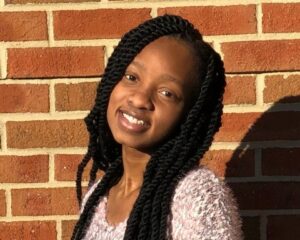Melanie Exum ‘21 is a master’s degree student in speech-language pathology, which is housed in the UNC School of Medicine Department of Allied Health Sciences. Exum is at the close of her first semester in graduate school, and she’s leaning toward working with children following graduation. She hopes to stay close to North Carolina to begin clinical practice. In the department, she is part of its Allied Health Ambassadors team of students who are working to increase awareness and diversity in health science professions.

Hometown:
Goldsboro, NC
Undergraduate area of study:
Human development and family studies major; double minor in education and speech and hearing sciences.
Why did you decide to pursue a master’s degree in speech and hearing sciences?
My mom mentioned speech therapy to me in high school, because she could see me doing that. Once I realized it was a minor, I took that first class and figured out that it was a field for me; it was where I belonged. … I knew I wanted to do something where I was helping people and doing something hands on. I have such a passion for communication.
What has the transition to graduate school been like?
It’s a different experience because you’re finally at that point where everything that you’re doing is directly affecting your future. You’re finally on your way to your career. It’s so nice to surround yourself who are in the same position as you; we’re all working toward the same goal. It has been a very encouraging, positive environment.
What does diversity in the classroom mean to you?
Half of my cohort are straight out of undergrad, or have traveled to different countries, worked in other professions, like being teachers. It enriches the classroom. It really has been interesting to see their perspectives on things because it definitely brings a lot of diversity into the classroom and to our cohort.
The field of speech-language pathology is something like 97 percent white; representation was a big thing for me. Not only for the people behind me—the people who may be looking up to me and wanting to see someone who looks like them in the field—but also for clients and patients. … Being a Black woman was really important to me and something that I wanted to be a part of in this field to make a difference.
